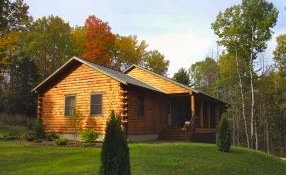Where do Vermont honey bees go in winter?
 A friend of mine lives in Ferrisburg and keeps bees; he gave me a huge jar of honey as a new year’s gift. Local Vermont honey is a treat any time, but especially in winter after the sub zero weather we’ve had recently.
A friend of mine lives in Ferrisburg and keeps bees; he gave me a huge jar of honey as a new year’s gift. Local Vermont honey is a treat any time, but especially in winter after the sub zero weather we’ve had recently.
The other morning I noticed a live wasp enjoying the sunshine in the skylight over my shower. How can this little guy possibly be alive? He (she?) made me wonder about my friend’s bees. I know where bee lovers go in winter: Honey Gardens in Charlotte and Honey Lights in Bristol. We go to Honey Gardens for raw honey cold remedies and we go to Honey Lights for romantic winter lighting. But where are the wonderful creatures who make these delights possible now?
 Honeybees do not migrate, nor do they hibernate (like many Vermonters of a certain age). Honeybees stay here in Vermont in temperature-controlled hives. Very precisely the worker bees control the hive temperature by circulating their little bodies within the hive. The honey and pollen they store from their summer efforts fuels them at this work all winter.
Honeybees do not migrate, nor do they hibernate (like many Vermonters of a certain age). Honeybees stay here in Vermont in temperature-controlled hives. Very precisely the worker bees control the hive temperature by circulating their little bodies within the hive. The honey and pollen they store from their summer efforts fuels them at this work all winter.
On nice sunny winter days you can see honeybees taking what they call “cleansing flights”. They fly short distances from the hive to take care of business (eliminate waste). If a bee gets too chilled, it cannot fly home, so these winter flights are usually quite short.
Summer travel for bees is another story. Honey bees forage within a three-mile radius of the hive, which is why rural beekeeping is preferable to beekeeping in the middle of town.
Here are two suitable beekeeping properties in two different price ranges: one on 3 acres near the center of Middlebury, the other somewhat rural on 35 acres in N ew Haven. Click each image to view listing details.
ew Haven. Click each image to view listing details.
Though this new log cabin (built in 2005) is just north of down town Middlebury, it has 3 acres. Plenty of room for keeping bees. This log cabin has a back deck running the length of the home and a large front entrance deck. In season, both are great vantage points to watch your bees at work. This property also has an office with a private exit to the back deck. Could this be the office for your new honey business?
This New Haven, Vermont Home has meadows and in spring, apple blossoms. 125 Sherman Lane, New Haven is rural and private but is still only 10 minutes from Middlebury & 40 minutes from Burlington. The property includes 35 acres with large lawn area, pond, pernnial gardens and magnificant views of the mountains from almost every room. An additional 20+/- acres is also available.
Contact me for more information about these and other Vermont homes with land.
Bee image credits: greenforkutah.blogspot.com and mudsongs.org
Where do Vermont honey bees go in winter?
 A friend of mine lives in Ferrisburg and keeps bees; he gave me a huge jar of honey as a new year’s gift. Local Vermont honey is a treat any time, but especially in winter after the sub zero weather we’ve had recently.
A friend of mine lives in Ferrisburg and keeps bees; he gave me a huge jar of honey as a new year’s gift. Local Vermont honey is a treat any time, but especially in winter after the sub zero weather we’ve had recently.
The other morning I noticed a live wasp enjoying the sunshine in the skylight over my shower. How can this little guy possibly be alive? He (she?) made me wonder about my friend’s bees. I know where bee lovers go in winter: Honey Gardens in Charlotte and Honey Lights in Bristol. We go to Honey Gardens for raw honey cold remedies and we go to Honey Lights for romantic winter lighting. But where are the wonderful creatures who make these delights possible now?
 Honeybees do not migrate, nor do they hibernate (like many Vermonters of a certain age). Honeybees stay here in Vermont in temperature-controlled hives. Very precisely the worker bees control the hive temperature by circulating their little bodies within the hive. The honey and pollen they store from their summer efforts fuels them at this work all winter.
Honeybees do not migrate, nor do they hibernate (like many Vermonters of a certain age). Honeybees stay here in Vermont in temperature-controlled hives. Very precisely the worker bees control the hive temperature by circulating their little bodies within the hive. The honey and pollen they store from their summer efforts fuels them at this work all winter.
On nice sunny winter days you can see honeybees taking what they call “cleansing flights”. They fly short distances from the hive to take care of business (eliminate waste). If a bee gets too chilled, it cannot fly home, so these winter flights are usually quite short.
Summer travel for bees is another story. Honey bees forage within a three-mile radius of the hive, which is why rural beekeeping is preferable to beekeeping in the middle of town.
Here are two suitable beekeeping properties in two different price ranges: one on 3 acres near the center of Middlebury, the other somewhat rural on 35 acres in N ew Haven. Click each image to view listing details.
ew Haven. Click each image to view listing details.
Though this new log cabin (built in 2005) is just north of down town Middlebury, it has 3 acres. Plenty of room for keeping bees. This log cabin has a back deck running the length of the home and a large front entrance deck. In season, both are great vantage points to watch your bees at work. This property also has an office with a private exit to the back deck. Could this be the office for your new honey business?
This New Haven, Vermont Home has meadows and in spring, apple blossoms. 125 Sherman Lane, New Haven is rural and private but is still only 10 minutes from Middlebury & 40 minutes from Burlington. The property includes 35 acres with large lawn area, pond, pernnial gardens and magnificant views of the mountains from almost every room. An additional 20+/- acres is also available.
Contact me for more information about these and other Vermont homes with land.
Bee image credits: greenforkutah.blogspot.com and mudsongs.org









